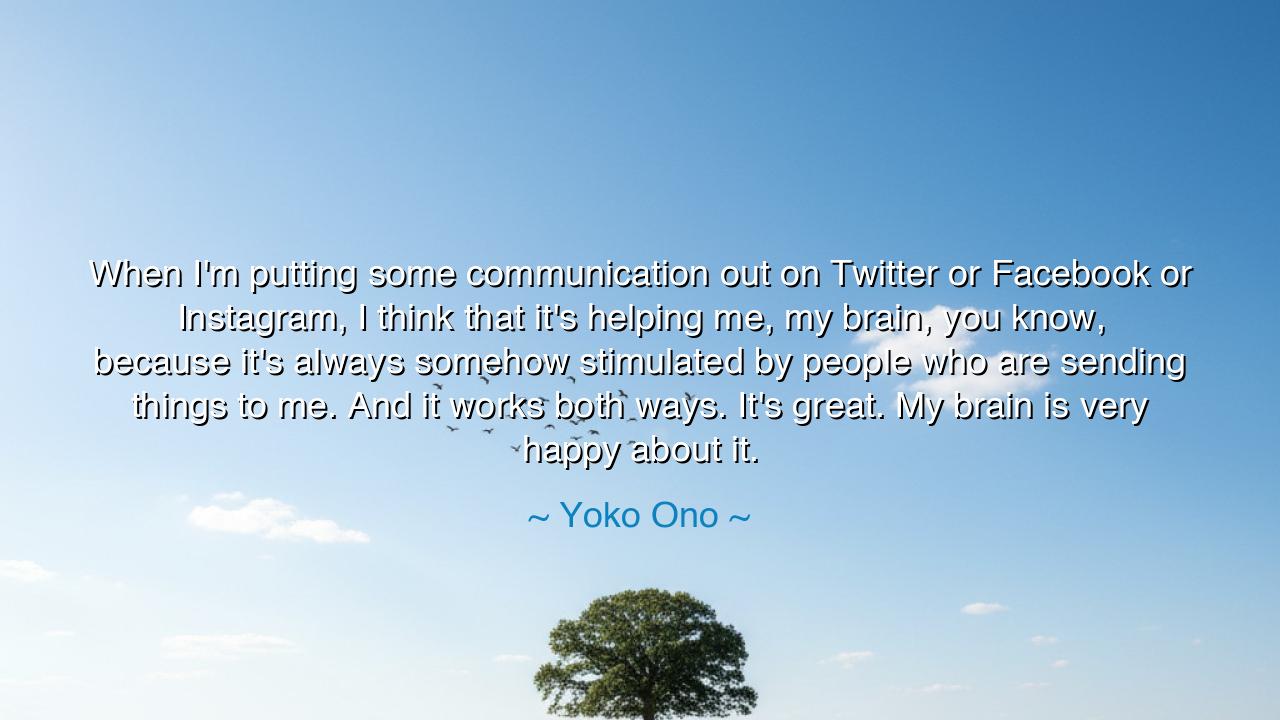
When I'm putting some communication out on Twitter or Facebook or
When I'm putting some communication out on Twitter or Facebook or Instagram, I think that it's helping me, my brain, you know, because it's always somehow stimulated by people who are sending things to me. And it works both ways. It's great. My brain is very happy about it.






Host: The room was quiet, the gentle hum of the evening outside melding with the peaceful stillness inside. Jack sat at the table, his fingers lightly tracing the edge of his cup, clearly absorbed in the words of Yoko Ono. Jeeny stood near the window, her gaze focused outward, thinking deeply about the way social media influences both our thoughts and our emotions.
Jeeny: “I’ve been thinking about what Yoko Ono said: ‘When I’m putting some communication out on Twitter, Facebook, or Instagram, I think that it’s helping me, my brain, you know, because it’s always somehow stimulated by people who are sending things to me. And it works both ways. It’s great. My brain is very happy about it.’ It’s such an interesting way to look at social media, isn’t it? The idea that sharing and receiving messages online can actually be a source of stimulation and fulfillment.”
Jack: “Yes, it’s fascinating. Ono seems to be acknowledging that social media isn’t just about broadcasting your thoughts—it’s about the interaction that happens when people engage with you. It’s a form of exchange that stimulates her mind, keeps it active and engaged. She’s not just sending things out into the void; she’s engaging in a dialogue, and that interaction, that flow of ideas and reactions, makes her brain feel alive and happy.”
Jeeny: “Exactly. The idea that social media can actually benefit our minds, that it can be something positive rather than just a distraction, is so interesting. We often think of these platforms as a way to escape or kill time, but Ono sees it as a way to keep her brain engaged, to be stimulated by the constant flow of information. It’s like she’s actively participating in a conversation, not just with the people around her, but with the wider world.”
Host: The stillness in the room deepened, the weight of their reflection on the role social media plays in our lives settling between them. Jack’s fingers rested on the table, while Jeeny’s gaze softened, considering how often we view social media as something that detracts from real interaction, but how it can also enhance and engage us in ways we might not fully realize.
Jack: “It makes me think about how we often focus on the negatives of social media—the distractions, the comparison, the noise—but Ono is showing us another side. She’s talking about how social media can be a stimulus, how it provides a constant flow of ideas, interactions, and responses that help us stay mentally sharp and connected.”
Jeeny: “Yes, and it’s not just about the content she’s receiving—it’s the interaction that makes it meaningful. It’s not a passive experience; it’s an active engagement with the world. The more we interact, the more we share and respond, the more our minds are engaged. It’s like a mental workout. Ono sees social media as a tool for mental stimulation and connection, not just entertainment.”
Jack: “That’s the key, isn’t it? Social media isn’t inherently good or bad—it’s how we use it. If we use it to engage meaningfully, to share ideas and stimulate our thoughts, it can be an amazing tool. But if we use it as a passive way to just consume, to scroll endlessly without interacting, it can become more of a distraction than a tool for growth.”
Jeeny: “Exactly. It’s about intent—what we’re getting out of it and how we’re using it. Ono finds it stimulating because it’s a two-way exchange, a way to be involved in a conversation that’s happening constantly. When we engage with social media in a way that stimulates our thoughts, connects us with others, and challenges our perspectives, it can be a really positive experience.”
Host: The room had grown quieter now, the weight of their conversation lingering in the air. The idea that social media, often criticized for its negative impact, can also be a source of mental stimulation and positive engagement had settled between them. Jack’s fingers rested lightly on the table, and Jeeny’s expression softened, reflecting on how we can choose to use these platforms in ways that enhance our lives rather than detract from them.
Jack: “So, it’s about engagement. If we approach social media as a way to connect, to share ideas, and to engage meaningfully, it can be a powerful tool for growth. Ono is showing us that it’s not the medium, but how we choose to use it, that makes all the difference.”
Jeeny: “Yes, exactly. Social media can be more than just a way to waste time. If we engage with it thoughtfully, it can be a way to stimulate our minds, to share and receive ideas, and to keep ourselves connected and engaged with the world.”
Host: The evening had settled into a quiet understanding that the value of social media isn’t inherent—it’s about how we use it. Yoko Ono had reminded them both that when used intentionally, social media can be a tool for mental stimulation, connection, and growth. It’s a choice we make every time we engage, a reminder that how we interact with the world shapes the way we experience it. The world outside had grown dark, but inside, there was light—a realization that social media, like any tool, can be as enriching as we allow it to be.






AAdministratorAdministrator
Welcome, honored guests. Please leave a comment, we will respond soon